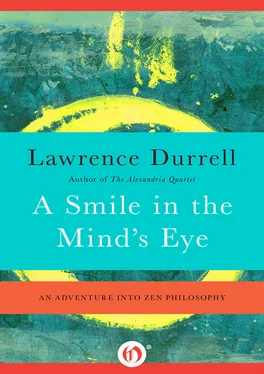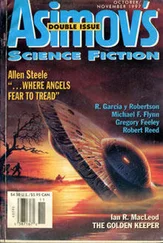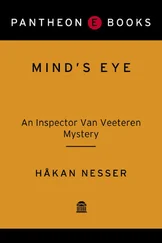Lawrence Durrell - A Smile in the Mind's Eye
Здесь есть возможность читать онлайн «Lawrence Durrell - A Smile in the Mind's Eye» весь текст электронной книги совершенно бесплатно (целиком полную версию без сокращений). В некоторых случаях можно слушать аудио, скачать через торрент в формате fb2 и присутствует краткое содержание. Год выпуска: 2012, Издательство: Open Road Media, Жанр: Путешествия и география, на английском языке. Описание произведения, (предисловие) а так же отзывы посетителей доступны на портале библиотеки ЛибКат.
- Название:A Smile in the Mind's Eye
- Автор:
- Издательство:Open Road Media
- Жанр:
- Год:2012
- ISBN:нет данных
- Рейтинг книги:3 / 5. Голосов: 1
-
Избранное:Добавить в избранное
- Отзывы:
-
Ваша оценка:
- 60
- 1
- 2
- 3
- 4
- 5
A Smile in the Mind's Eye: краткое содержание, описание и аннотация
Предлагаем к чтению аннотацию, описание, краткое содержание или предисловие (зависит от того, что написал сам автор книги «A Smile in the Mind's Eye»). Если вы не нашли необходимую информацию о книге — напишите в комментариях, мы постараемся отыскать её.
is a charming tale of a writer’s spiritual and philosophical awakening.
A Smile in the Mind's Eye — читать онлайн бесплатно полную книгу (весь текст) целиком
Ниже представлен текст книги, разбитый по страницам. Система сохранения места последней прочитанной страницы, позволяет с удобством читать онлайн бесплатно книгу «A Smile in the Mind's Eye», без необходимости каждый раз заново искать на чём Вы остановились. Поставьте закладку, и сможете в любой момент перейти на страницу, на которой закончили чтение.
Интервал:
Закладка:
But these and other matters got themselves quite entangled in the question of cookery — for Chang had now begun to feel his feet in the pleasant kitchen with its red-tiled floor. To me he delegated the task of cutter-up for the carefully washed vegetables; in defence too of my gallant Indians, among whom I spent the first ten years of my existence, I introduced a few touches of India to the sauce — curry and ginger — which met with approval. We had found nuts and raisins in the market as well, while my guest was eager to explore a few of the cheeses of France. It was a pleasant and fruitful work, assembling all these deliciously steamed still crunchy vegetables. It was also a symbolic meeting place of the two great cuisines of the world — French and Chinese.
2
Among so many subjects we were apt to lose our way from time to time — Chang replying to my eager questions no less eagerly; he seemed glad to have someone at hand with whom he could discuss these matters, albeit in English. My knowledge though highly provisional and sketchy was quite a help towards my understanding of his text, which was an outline of a sort of love-therapy — not rigidly schematic and fossilized like the Kama Sutra, though much upon the same lines. I asked him about yoga and told him I dabbled in the Indian method. ‘I do Chinese yoga,’ he said. ‘it’s a bit different — more fluent, less static.’ Waving a wooden spoon he did a couple of swooping figures, not unlike ballroom dancing, gliding out into the old glassed-in verandah like an ice-skater. I tried to copy him to see how it felt. At that moment the morose existentialist gardener who sometimes works for me came down the drive, and peering in saw me apparently waltzing with a Chinaman. We did not see him ourselves. But his nerve was badly shaken by the sight and he retreated to the village tavern. Oblivious to all this we danced on, Chang and I, until a simmering noise called us back to the cooking pots.
3
The question of immortality also raised its head early on in the conversations and I found that my guest was absolutely convinced that it was not a figure of speech, that it was on the menu, so to speak, though factually it could only be achieved by the greatest sages. There existed records, however, which pointed the way. As far as he was concerned all he wished to illuminate in the text under consideration was the fact that if a man adapted himself to the Taoist view seriously — he could easily top the hundred, and might expect without being specially gifted to live to 150. In such a life there was no reason why he should not expect to make love happily well into his nineties, as well as keep all or most of his teeth. Everything was connected to his diet, both spiritual and physical. ‘I myself propose to live to 120 years at least. If I had started this technique much earlier I could expect to go the full way. But the question of food and of sexual love is paramount, and here the book has something to teach us. You will understand that I have assembled and translated these texts first for my own pleasure and then as a work of advocacy for a world which quietly accepts to be flung on the scrap-heap around the age of fifty; which loses its sexual abilities soon after forty in many cases; and which uses the orgasm as a sort of yardstick of well-being, when it can, after forty, be restrained and reeducated in the service of insight rather than trivialized in mere pleasure …’
This, then, was a sort of treatise on coitus reservatus and the transmutation of physical love into a delight based in physical contact, cherishing rather than ravishing. I could see too that he believed that we in the West used the orgasm rather as a weapon; it proved to the individual’s ego that he was dominating his partner. Sex could be used assertively. In these ancient texts it was emphasized over and over again that the man’s sperm (the same Chinese character stands for sperm and essence, just to confuse the western wits) was extremely precious; it should be treated as such and conserved as much as possible after the age of forty if one was going to take the long haul towards immortality. Chang himself had adopted the ancient technique. He limited himself to one orgasm per one hundred love-encounters, approximately, and he managed to make love to several girls in the same day! It sounded absolutely outlandish to my western mind; yet here in the text was the advice and guidance of the ancient Love-Masters who counselled this method of preserving health and longevity. The organization of the woman is so different that she is fortified rather than depleted by the orgasm and consequently she did not play so great a part in the book, except as a fully responsive and cherishing partner for the man. But it was clear that she would profit handsomely from this system! Chang felt that with the important changes in the sexual scene based on the invention of the Pill in the West, the time was ripe for a work of Chinese scholarship along these traditional lines. But how to get over his meaning without giving the impression of lubricity or indelicacy? For the Chinese mind sexuality was the rarest flower of the spiritual gai savoir — and compared to the odious prurience and brutality of the western attitude it is difficult to situate it clearly for what it is — the meeting ground of two perfections. That is why, for example, there was nothing in the text about oblong considerations like homosexuality, lesbianism, deviations so dear to the contemporary mind. In the context of the Tao (for the purposes of his text) they did not really exist. Or if they did, they did not concern his theme — for the love-partners described in the text enjoyed the functional polarity of male and female with the Tao. The sexual act was a love act which meshed them into the whole of cosmic process; not a pillow-fight between egos determined to dominate each other. The whole sexual gymkhana of the West — the eternal plucking at the ego — filled Chang with sadness, and I could very well see why.
The image he used, the simple analogy which in a way echoed the double snakes twined round the shaft of the spine (caduceus-wise), was the ordinary light bulb with its twining filaments which between them rise to the base of the skull and confer light. Why write a treatise to include everything that was out of this phase — all the gynandromorph forms which produced only darkness wherever nature had slipped? The treatise was upon love achieved, not love among the ruins of our sexual culture. I am afraid that his analysis of our sad state seemed perfectly accurate when he laid the blame at the door of Christianity — with its cult of the ego, of original sin, of the wrathful God, and so on. How pure and kindly the simple Chinese ordinances seemed when one thought of our plight in the West. It was most instructive to me to see ourselves through his Chinese eyes. The aesthete in Chang was disgusted and terrified when he thought of the sexual atmosphere of cruelty and ugliness which he found in the arts; but he was just as shocked when he thought of the bulging dustbins of Los Angeles and London, the reckless improvidence which led us to pollute and devastate our natural inheritance upon earth in a perverse almost deliberate search for unhappiness. The question of sexual deviation led him on his side to question me about such matters. Was there much homosexuality in Tibet? No, but plenty in Mount Athos and the Vatican! Could it be that the element of narcissism which is at the base of it in the Freudian analysis is vastly strengthened by the Christian code, the cult of the Luciferian will to power? He laughed, and admitted that it could be true.
‘People want to have done with sex because it has brought them nothing but shame and disappointment; and its misuse has brought them to a premature old age. They lack desire themselves and because of the fearful things they eat they smell so awful that nobody feels like caressing them. Old age is a dreadful thing in the West. No wonder it is feared, no wonder the old are put away in remote flats or old-age communities and left to die. They have no further function, and they have forfeited the joy which should be theirs.’ (I thought to myself: Why has the Dalai Lama got no Oedipus Complex? Answer: Because he has no mother and no father. The buck stops there!) But meanwhile what of the lovers — the Taoist lovers caught up in their eternal embrace, gathered into the spiral momentum of the All, the cosmic rhythm as it ripples slowly along its trajectory of yang and yin, back and forth, the pendulum of mother nature? What about Jack loves Jill? Chang grew irritated. ‘The lovers in the books are simply the representatives of a natural process. Of course Jack can love Jill and write love poems to her, not to mention to recite acrostics with rather questionable meanings, in order to make her laugh. But that aspect of things concerns their personalities, it is in the domain of the novel. This treatise presumes them to be The Perfect Couple, perfectly slotted into the science of the love-yoga: The Tao. It is beyond the man-eat-dog stage in human affairs. My lovers are the Nonpareil, the Peerless Lovers of the Taoist scheme. We shouldn’t address silly questions to people about them. Theirs is a condition to be aspired to, even if we never reach it.’ Simple as the sap travelling through the veins of a tree. Sadism, masochism, why be bothered with them except to regret that with them nature went out of true, and it was our fault? You become what you believe. The Taoist lovers, then, were ego-less; they were human embodiments of cosmic process; one was silly even to want to call them Jack and Jill when in reality they were sleepwalking yangs and yins … At this moment there was a power-cut and I thought of Chang’s pleasure and wonder every time he switched on the electric light with its ‘filaments of gratified if disembodied desire’. The gratification of the lovers lay on a different plane; by dint of mastering the orgasm one raised love to a higher frequency. One prolonged life, the immortal life which one was in honour bound to try and realize upon earth … How difficult it was to express all this in a way which might make good sense to someone brought up in the West, by the canons of a culture whose language was based on dichotomy. But perhaps more important even than this was that the ancient Taoist view of sexuality suggested that they considered it to be the basic mechanism upon which the happy and healthy functioning of the whole man depended. Hence the role of the Love-Masters whose field of investigation was the whole psycho-physical situation. ‘It is after all not so far from the psycho-somatic approach of modern medicine — only that contains no built-in cosmic doctrine designed to pull out the thorns of the ego.’
Читать дальшеИнтервал:
Закладка:
Похожие книги на «A Smile in the Mind's Eye»
Представляем Вашему вниманию похожие книги на «A Smile in the Mind's Eye» списком для выбора. Мы отобрали схожую по названию и смыслу литературу в надежде предоставить читателям больше вариантов отыскать новые, интересные, ещё непрочитанные произведения.
Обсуждение, отзывы о книге «A Smile in the Mind's Eye» и просто собственные мнения читателей. Оставьте ваши комментарии, напишите, что Вы думаете о произведении, его смысле или главных героях. Укажите что конкретно понравилось, а что нет, и почему Вы так считаете.











